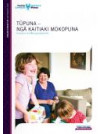This resource explores the experiences of Māori grandparents in New Zealand. Drawing on interviews and focus groups held with Māori grandparents, the resource describes the pleasures and pressures of grandparenting and the significant role many grandparents play in the lives of whānau. This includes providing support, sharing resources, and teaching te reo, whakapapa, history and tikanga. Many grandparents mentioned the aroha that they feel and express towards their mokopuna, and the joy of nurturing and observing their development. The relationships between grandparents and mokopuna generate significant benefits for both generations. Grandparents show resilience and flexibility in adapting and responding to changing family dynamics and other changes. Some of the pressures and challenges they experience could be alleviated through the provision of information and support tailored to their needs. Although Māori grandparents share many common characteristics, they also have differing ages, experiences and expectations and this diversity must be reflected in policy decisions that may affect their lives.
Purpose
We hope that this resource will assist readers in a number of ways. Firstly, this resource can be shared within wanānga, wharekura, marae and other organisations that work with and for Māori, to trigger discussions and reflections about the roles and responsibilities of Māori grandparents. We also hope it provides useful information to support Māori providers, Māori community workers, teachers and the many people who work with whānau. Lastly, we hope that this research can inform agencies, policy-makers and others about the particular issues faced by Māori grandparents and the need to include their voices in decision-making.
Methodology
A total of 187 Māori participated in the two main components of this research project:
- the telephone survey – 162 participants
- three focus groups – 25 participants. Focus group participants were largely self-selected, and many more grandmothers took part than grandfathers.
The three focus groups held with Mäori grandparents were co-facilitated by Māori members of the research team. Data from the telephone survey and focus groups were supplemented by information shared by Māori grandparents who took part in the Families Commission online ‘Couch Polls’, an omnibus telephone survey, and a facilitated forum for older people
Key Results
Grandparents play a significant role in the lives of many families, providing support through the provision of childcare and financial contributions. Sometimes this can lead to their own work-life balance and finances being stretched.
Māori grandparents are repositories of cultural knowledge and wisdom; the kaumātua leadership role in iwi and whānau has responsibilities compatible with those of the grandparenting role and both roles should continue to be honoured and valued.
For most grandparents the pleasures of grandparenting outweigh any pressures. Almost half of the Māori grandparents who took part in the telephone survey reported that they did not face any particular pressures being grandparents.
Māori grandparents told the research team about the responsibility and desire they feel to share skills, whakapapa, knowledge, wisdom, cultural practices and beliefs. Support may be needed, however, to ensure that Māori grandparents can continue to share their knowledge with their mokopuna, given increasing pressures on the traditional methods of teaching roles and responsibilities. Pressures include the erosion of traditional whānau supports through urbanisation and emigration.
Grandparents were sometimes critical of the way their mokopuna were parented. When there were significant concerns, some had taken over care of their mokopuna. Grandparents who raise grandchildren provide vital support to these children and to their parents. Amongst Māori, responsibility for children is traditionally widely shared, but cultural practices can conflict with legal and policy approaches. Māori grandparents who take over the care of their mokopuna, for example, may not want to seek formal custody of their mokopuna through the court system.
Financial pressures can be faced by grandparents who raise their mokopuna as primary caregivers, as well as by other grandparents who support their children and mokopuna.
Families Commission (2010) research shows that the contribution of Māori grandparents to New Zealand families needs to be recognised and valued by families, as well as by communities, government and society. Grandparents need a stronger voice in the development of policies and services that affect them. Policies and service provision must respond to the diverse nature of grandparents’ roles, family structures, lifestyles, ages, relationships and demographic characteristics.
The Commission would like to see more recognition of the multiple roles that Māori grandparents have and an acknowledgment of the support they may need in order to fulfil these roles. We hope that this resource will provide information and form a basis for informed debate that will lead to better public awareness of these roles.

